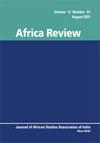精心设计的恐华症?从赞比亚爱国阵线看中国的身份认同
IF 0.5
Q4 AREA STUDIES
引用次数: 3
摘要
中国在赞比亚的身份认同一直以两极分化的方式构建,这取决于赞比亚人从政党、公民社会到普通公民的政治和社会地位。本文着眼于爱国阵线(PF)如何从反对党到执政党,构建中国的身份认同。民阵在执政期间对中国的敌意被描述为“恐华症”,即对中国的恐惧,对中国投资和中国公民存在的可能后果的恐惧。本文追溯了爱国阵线(作为反对党)如何从批评中国转变为坚定捍卫中国和赞比亚-中国关系(作为执政党)。得出的结论是,尽管“恐华症”是被制造出来的,但爱国阵线在执政期间表达的担忧是合理的,随着赞比亚与中国经济关系的深化,这种担忧变得更加严重。此外,本文认为,目前赞比亚反对党对中国的敌对立场强化了这样一种观点,即对于那些希望赢得普通赞比亚人支持的人来说,中国是一个合适的借口,普通赞比亚人忍受着来自中国投资、中国雇主和企业家的威胁。本文主要依靠赞比亚媒体、政府报告和立法文件、作者对中国在赞比亚的身份和兴趣的实证研究以及学术二手文献作为数据来源。本文章由计算机程序翻译,如有差异,请以英文原文为准。
A choreographed Sinophobia? An analysis of China's identity from the perspective of Zambia's Patriotic Front
ABSTRACT China's identity in Zambia has been constructed in polarizing terms depending on the political and social standing of Zambians from political parties, civil society to ordinary citizens. The current paper looks at how the Patriotic Front (PF), from its time as an opposition to its time as a governing party, has constructed China's identity. The ill-will towards China that the PF constructed in its opposition days is described here as Sinophobia, a fear of China, the likely consequences of its investment and the presence of Chinese nationals. The paper traces how the PF (as an opposition party) moved from being a critic of China to being a staunch defender of China and Zambia-China relations (as ruling party). The conclusions drawn are that while Sinophobia was constructed, the fears expressed by the PF during its opposition days were justifiable and have become even more significant with the deepening of Zambia-China economic relations. Furthermore, the paper argues that current hostile positions towards China by opposition parties in Zambia reinforce the argument that China is an opportune pretext for those who hope to win the support of ordinary Zambians, who endure the perceived threat that comes with Chinese investment and Chinese employers and entrepreneurs. The paper relied mainly on Zambian media, government reports and legislation documents, the author's empirical study on China's identity and interest in Zambia and scholarly secondary literature as sources of data.
求助全文
通过发布文献求助,成功后即可免费获取论文全文。
去求助
来源期刊

Africa Review
AREA STUDIES-
CiteScore
1.80
自引率
12.50%
发文量
22
期刊介绍:
Africa Review is an interdisciplinary academic journal of the African Studies Association of India (ASA India) and focuses on theoretical, historical, literary and developmental enquiries related to African affairs. The central aim of the journal is to promote a scholarly understanding of developments and change in Africa, publishing both original scholarship on developments in individual countries as well as comparative analyses examining the wider region. The journal serves the full spectrum of social science disciplinary communities, including anthropology, archaeology, history, law, sociology, demography, development studies, economics, education, gender studies, industrial relations, literature, politics and urban studies.
 求助内容:
求助内容: 应助结果提醒方式:
应助结果提醒方式:


